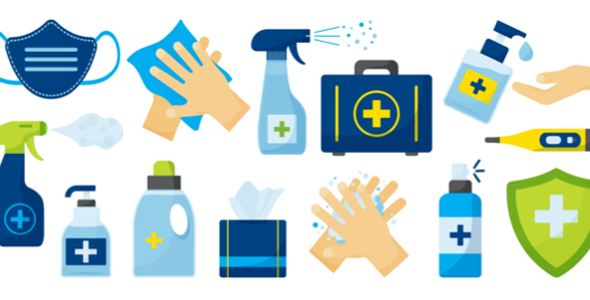By the bioMérieux Connection Editors
The COVID-19 pandemic has shown the world how valuable and important infection prevention programs are. In addition to handling routine threats such as flu season and healthcare associated infections, infection prevention and control programs around the world have shifted into overdrive to fight the pandemic and keep communities healthy.
“Infection preventionists (IPs) form the backbone of risk mitigation efforts around the [United States], but because their goal is to prevent something from happening, it’s harder to see what they do,” said APIC 2020 President, Connie Steed, during a September APIC press release. “COVID-19 has shown the world how crucial IPs are in keeping our communities safe.”
International Infection Prevention Week (IIPW) is an annual awareness campaign organized by the Association for Professionals in Infection Control and Epidemiology to showcase the importance of infection prevention. This year’s IIPW will be held from October 18-24. Its intentions are to shine a spotlight on the infection preventionist’s crucial role protecting frontline healthcare workers and patients from COVID-19, and to encourage others to honor and thank IPs for their efforts. The 2020 theme for IIPW is #WeLoveIPs.
IIPW was established in 1986 by President Ronald Regan. The week was created to focus attention on infection prevention and help save lives as well as healthcare dollars. Over the years, many other regions of the world have begun to participate in this week of recognition, including Australia, and parts of Southeast Asia, and the Middle East.
In general, the role of infection control is to prevent and reduce the risk for healthcare associated infections. This can be achieved through infection control programs that implement methods and tactics for surveillance, isolation, outbreak management, environmental hygiene, employee health, education, and infection prevention.
Antimicrobial stewardship is also a large component and/or partner of infection control. Increasingly, hospitals are adopting antimicrobial stewardship programs (ASPs) to control antimicrobial resistance, improve patient outcomes, and reduce healthcare costs. One major responsibility many ASPs have is monitoring the healthcare facility’s antimicrobial susceptibility profiles to anticipate and assess any new antimicrobial resistance patterns. These profiles come from tests that show whether certain antibiotics can treat a particular infection or if the infection has become resistance to the antibiotic. This type of surveillance, as well as other stewardship tactics, can meaningfully contribute to infection control programs.
Particularly now, in the midst of treating patients with COVID-19, the partnership between infection prevention and control programs and ASPs is important. According to numerous studies, antibiotics—which treat bacterial infections and not viruses—have been given to most hospitalized COVID-19 patients and potentially 80-100% of COVID-19 patients in the ICU. These studies are raising concerns about the potentially inappropriate over-prescribing of antibiotics that is contributing unnecessarily to antibiotic resistance.
This year, the APIC would like IIPW to be a time of celebration for the bravery and tireless efforts of the world’s IPs. Support IIPW by learning more about COVID-19 infection prevention and doing your part to follow infection prevention guidelines. You can learn more about guidelines for both patients and healthcare professionals by visiting the APIC’s resource page.
Opinions expressed in this article are not necessarily those of bioMérieux, Inc.



